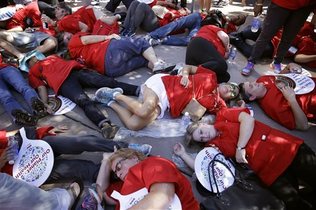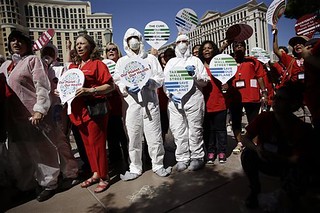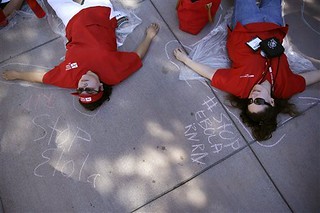 |  |
 |  |
NURSES' PROTEST SAYS US HOSPITALS ARE NOT PREPARED FOR EBOLA
The CDC says we will stop Ebola in its tracks. The USA is prepared, they say. We have this fabulous, modern healthcare system, they say. It can't happen here, they say.
Really?
I won't even begin to get into the nonsense about our fabulous healthcare system all that much. I mean, we don't even have a system, let alone a fabulous one. We have a whole lot of great technology and we have a whole lot of great healthcare workers, but a system, I don't think so. A system would imply something that can take care of all our citizens. Does anyone believe that describes our "system?" We have a mess of private, not for profit, governmental, insurance company, big pharmacy, conglomeration. That's what we've got. You know that. I know that. We all know that.
Don't get me wrong, again our healthcare workers and our technology and knowledge could be a fabulous healthcare system. Capital just won't allow it to be.
Okay, enough of that.
Are we prepared for a real epidemic of something like Ebola or H5N1 flu?
A whole lot of nurses are saying they don't think so. Just last week a thousand nurses at a convention in Las Vegas staged protest rally and a die in to highlight what they said was, the lack of training, equipment and isolation rooms where suspected Ebola-infected patients in the US could be quarantined. The nurses wore hazmat suits and red shirts during the protest and also observed a moment of silence for international health workers who have died while trying to care for Ebola patients in West Africa.
Ebola "can easily come to our shores, and we're not ready," said Julia Scott, a registered nurse from Largo Medical Center in Florida who was attending the rally.
The nurses were responding in part to the comments of a top federal health official who told a Senate committee last week that Ebola could come to the USA...which it now has.
Despite the nurses' concerns, Roslyne Schulman, policy director for the American Hospital Association, said members are prepared to "handle a broad range of infectious diseases" and have been encouraged to follow the federal Centers for Disease Control's recommendations for how to respond to the Ebola virus.
"When there is a potential risk for particular infections in communities — such as Ebola — hospitals alert their clinical staff to increase surveillance for symptoms and risk factors associated with the specific disease," she said in an emailed statement.
Fat lot of good that did when a Dallas healthcare team at one of those large, modern hospital either failed to get or failed to read a report prepared by an ER nurse which documented that the patient now confined there with Ebola had just come from Liberia. As you know, the hospital sent the fellow home with some antibiotics. Kind of confirms that feeling I think we all have that all those health history forms and the like we fill out constantly when we visit our healthcare provider are never actually read by the doctor who sees us.
Mistakes happen, but this one should not have happened now, and as I indicate above, I don't view it so much as a mistake but rather as routine.
Several weeks ago, National Nurses United began surveying registered nurses across the U.S. about emergency preparedness. In preliminary results from more than 400 RNs in more than two dozen states:
- More than 60 percent of RNs say their hospital is not prepared for the Ebola virus.
- 80 percent say their hospital has not communicated to them any policy regarding potential admission of patients infected by Ebola
- 85 percent say their hospital has not provided education on Ebola
- 30 percent say their hospital has insufficient supplies of eye protection (face shields or side shields with goggles) and fluid resistant gowns
- 65 percent say their hospital fails to reduce the number of patients they must care for to accommodate caring for an “isolation” patient
A recent report from the Department of Homeland Security’s Inspector General warned the U.S. is ill-equipped to handle a major pandemic, despite the federal government allocating at least $47 million to prepare for it since 2006.
Here is something you have heard nothing about. What happens to infectious waste generated in the USA by an Ebola patient. Well, Reuters reports that:
Waste management companies are refusing to haul away the soiled sheets and virus-spattered protective gear associated with treating the disease, citing federal guidelines that require Ebola-related waste to be handled in special packaging by people with hazardous materials training...
Claims Journal goes further,
Many U.S. hospitals are unaware of the regulatory snafu, which experts say could threaten their ability to treat any person who develops Ebola in the U.S. after coming from an infected region. It can take as long as 21 days to develop Ebola symptoms after exposure.
The issue created problems for Emory University Hospital in Atlanta, the first institution to care for Ebola patients here. As Emory was treating two U.S. missionaries who were evacuated from West Africa in August, their waste hauler, Stericycle, initially refused to handle it. Stericycle declined comment.
Ebola symptoms can include copious amounts of vomiting and diarrhea, and nurses and doctors at Emory donned full hazmat suits to protect themselves. Bags of waste quickly began to pile up.
“At its peak, we were up to 40 bags a day of medical waste, which took a huge tax on our waste management system,” Emory’s Dr. Aneesh Mehta told colleagues at a medical meeting earlier this month.
Emory sent staff to Home Depot to buy as many 32-gallon rubber waste containers with lids that they could get their hands on. Emory kept the waste in a special containment area for six days until its Atlanta neighbor, the U.S. Centers for Disease Control and Prevention, helped broker an agreement with Stericycle.
The CDC has issued detailed guidelines on how hospitals can care for such patients, but their recommendations for handling Ebola waste differs from the U.S. Department of Transportation, which regulates the transportation of infectious waste.
CDC advises hospitals to place Ebola-infected items in leak-proof containers and discard them as they would other biohazards that fall into the category of “regulated medical waste.”
According to DOT guidelines, items in this category can’t be in a form that can cause human harm. The DOT classifies Ebola as a Category A agent, or one that is potentially life-threatening.
DOT regulations say transporting Category A items requires special packaging and hazmat training.
CDC spokesman Tom Skinner said the agency isn’t aware of any packaging that is approved for handling Ebola waste.
As a result, conventional waste management contractors believe they can’t legally haul Ebola waste, said Thomas Metzger, communication director for the National Waste & Recycling Association trade group.
Part of Emory’s solution was to bring in one of the university’s large-capacity sterilizers called an autoclave, which uses pressurized steam to neutralize infectious agents, before handing the waste off to its disposal contractor for incineration.
Few hospitals have the ability to autoclave medical waste from Ebola patients on site.
“For this reason, it would be very difficult for a hospital to agree to care for Ebola cases – this desperately needs a fix,” said Dr Jeffrey Duchin, chair of the Infectious Diseases Society of America’s Public Health Committee.
Dr. Gavin Macgregor-Skinner, an expert on public health preparedness at Pennsylvania State University, said there’s “no way in the world” that U.S. hospitals are ready to treat patients with highly infectious diseases like Ebola.
“Where they come undone every time is the management of their liquid and solid waste,” said Macgregor-Skinner, who recently trained healthcare workers in Nigeria on behalf of the Elizabeth R. Griffin Research Foundation.
Skinner said the CDC is working with DOT to resolve the issue. He said the CDC views its disposal guidelines as appropriate, and that they have been proven to prevent infection in the handling of waste from HIV, hepatitis, and tuberculosis patients.
At the Las Vegas rally RoseAnn DeMoro, executive director of National Nurses United said that the time for a dramatic response to this stuff is now.Joe Delcambre, a spokesman for DOT’s Pipeline and Hazardous Materials Safety Administration, could not say whether requiring hospitals to first sterilize Ebola waste would resolve the issue for waste haulers. He did confirm that DOT is meeting with CDC.
“This potential exposure of patients and healthcare workers demonstrates the critical need for planning, preparedness and protection at the highest level in hospitals throughout the nation," said Bonnie Castillo, RN, director of NNU’s Registered Nurse Response Network, which is coordinating the RN response.
“The clock is ticking. It is long past time to act,” Castillo said. Preparedness for disease outbreaks is a long standing problem, note the nurses, citing the death of a U.S. nurse in a California hospital infected during the H1N1 outbreak in 2009.
NNU is calling for:
“The clock is ticking. It is long past time to act,” Castillo said. Preparedness for disease outbreaks is a long standing problem, note the nurses, citing the death of a U.S. nurse in a California hospital infected during the H1N1 outbreak in 2009.
NNU is calling for:
- All U.S. hospitals to immediately implement a full emergency preparedness plan for Ebola, or other disease outbreaks. That includes full training of hospital personnel along with proper protocols and training materials for responding to outbreaks, adequate supplies of all personal protective equipment, properly equipped isolation rooms to assure patient, visitor and staff safety, and sufficient staffing to supplement nurses and other health workers who need to care for patients in isolation.
- Significant increases in provision of aid, financial, personnel, and protective equipment, from the U.S., other governments, and private corporate interests to the nations in West Africa directly affected to contain and stop the spread of Ebola.
- Proper funding of international disaster relief and global health agencies whose budgets have been cut as a result of austerity measures implemented by the wealthiest nations.
- Stepped up action on the climate crisis which has contributed to the spread of disease outbreaks. Scientific American in 2008 named Ebola, which is directly affected by drought-related deforestation, as one of a dozen epidemics likely to be spurred by climate change.
Meanwhile least we forget, the total number of probable, confirmed and suspected cases in the current West Africa Ebola Virus Disease(EVD) outbreak as of 28 September 2014 is 7,178, with 3,338 deaths according to the health ministries of Guinea, Liberia, Nigeria, Senegal and Sierra Leone.
The World Health Organization (WHO) says the upward epidemic trend continues in Sierra Leone and most probably also in Liberia. By contrast, the situation in Guinea appears to be more stable, though it must be emphasized that in the context of an outbreak of EVD, a stable pattern of transmission is still of grave concern, and could change quickly.This is a leap from 6553 (probable, confirmed and suspected) cases and 3083 deaths reported as of Sept. 23.
Responding to the growing numbers of reported cases (and the certainty that there are exponentially more unreported cases) of persons sick and dying of Ebola in West Africa, NNU's DeMoro said simply, "It's not acceptable that these people are dying."
No, it is not and, as I have written previously in several earlier posts here, while the virus is the direct cause of these deaths it is global capital, healthcare inequality, poverty, and racism which is the true culprit in this and related epidemics.
NOTE: There is one other thing I have to say which troubles me. Everyone is relying a whole lot on self reporting and self quarantining, and the like. I think experience (including my own history of work in community health) says, "that's a nice thought," but certainly cannot always be counted upon.
The following is a press release from National Nurses United.
Nurses Call on U.S. Hospitals to Improve Emergency Preparedness for Potential Ebola U.S. Infections
National Nurses United Press Release, 10/2/14
Following reports that a Dallas hospital failed to hospitalize a patient infected with the Ebola virus and failed to properly communicate essential information to caregivers about his health status, National Nurses United is stepping up the call on U.S. hospitals to immediately upgrade emergency preparations for Ebola in the U.S.
“At a rally of 1,000 nurses last week in Las Vegas, we warned that it was just a matter of time in an interconnected world that we would see Ebola in the U.S. Now, everyone should recognize that Texas is not an island either, and as we’ve heard from nurses across the U.S., hospitals here are not ready to confront this deadly disease,” said NNU executive director RoseAnn DeMoro.
As one step, NNU members from the California Nurses Association Wednesday met with officials of Kaiser Permanente, the largest hospital chain in California, proposing Kaiser immediately upgrade its pandemic disease preparedness, including planning, communications, hands on training and availability of proper protective equipment, including Hazmat suits, the most effective protective gear.
Kaiser said that Hazmat suits are not needed, even though nurses, doctors and other health workers have been infected and died in what the World Health Organization calls “unprecedented” numbers in West Africa.
Kaiser also insists its hospitals are prepared, despite an experience at a Kaiser hospital in Sacramento in August demonstrating the scope of the problem when a patient who it was feared had been exposed to Ebola came to the hospital.
No information was given to staff until after the potential exposure was reported by local media, even though the patient had already been in the hospital for two days and had come in contact with many RNs and other staff. Outraged RNs then marched on hospital officials protesting the mishandling of the situation and demanding proper education, training, and equipment for frontline nurses.
The Sacramento example, and Kaiser’s response this week “is very alarming to frontline nurses,” said CNA co-president Zenei Cortez, a Kaiser RN. “Whatever Kaiser is doing, their plans have never included any frontline nurses who would be the first ones to come into contact with patients exposed to any pandemic disease. It shows a total disregard for protecting patients, staff, and the wider public,” said Cortez.
Preliminary results of an NNU survey released this week showed Kaiser is hardly unique. The survey of hundreds of nurses in more than 200 hospitals in 25 states has found that more than 60 percent say their hospital is not prepared for the Ebola virus. More than 80 percent say their hospital has not communicated to them any policy regarding potential admission of patients infected by Ebola. Another 30 percent say their hospital has insufficient supplies of eye protection and fluid resistant gowns.
The Dallas case, where the infected patient was sent home after arriving at the hospital, hardly provides any reassurance, said NNU today.
Media reports have indicated that the Dallas patient’s exposure was not properly communicated to hospital staff. Hospital officials reportedly told the media they had done one drill, “but nurses and other hospital staff work around the clock. One drill is hardly sufficient,” said Bonnie Castillo, RN, director of NNU’s Registered Nurse Response Network which is coordinating NNU’s Ebola response.
NNU is calling for all U.S. hospitals to immediately implement a full emergency preparedness plan for Ebola, or other disease outbreaks. That includes:
- Full training of hospital personnel along with proper protocols and training materials for responding to outbreaks,
- Adequate supplies of Hazmat suits and other personal protective equipment
- Properly equipped isolation rooms to assure patient, visitor and staff safety,
- Sufficient staffing to supplement nurses and other health workers who need to care for patients in isolation.
NNU is also calling for significant increases in provision of aid, financial, personnel, and protective equipment, from the U.S., other governments, and private corporate interests to the nations in West Africa directly affected to contain and stop the spread of Ebola.
No comments:
Post a Comment